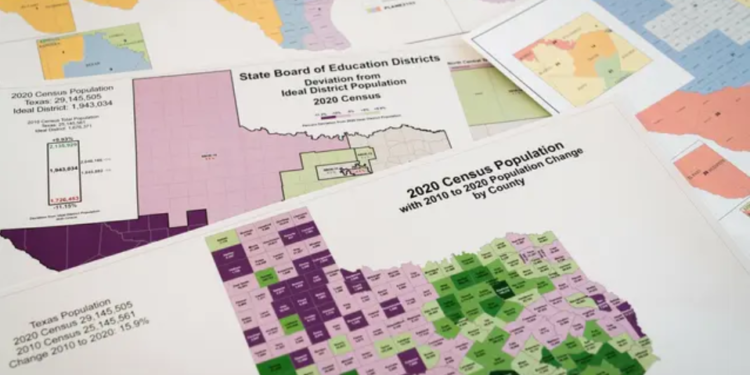March 30, 2025 Story by: Editor
The Department of Justice has officially withdrawn from a lawsuit challenging Texas’ legislative and congressional district maps, which were redrawn following the 2020 U.S. census. A case initially brought forth by the League of United Latin American Citizens (LULAC) and supported by Congresswoman Eddie Bernice Johnson, marks a significant shift in the legal landscape surrounding electoral districting in the state. The lawsuit alleged that these maps discriminated against Latino and Black voters by limiting their ability to participate equally in the electoral process.
In Texas, a DOJ attorney told a panel of judges, shortly before the start of a courtroom trial, that the federal government wanted to dismiss all of its claims against the state’s maps of congressional and state legislative voting districts. The federal government had previously claimed those maps dilute the voting strength of Black and Latino voters.
“At the March 5, 2025 status conference, the United States announced on the record that it wishes to voluntarily dismiss all of the claims it has asserted against Defendants in this case.Defendants and all of the other Plaintiffs stipulated to the dismissal on the record,” an order dismissing the United States’ claims said.
This move is part of a broader trend under President Donald Trump’s administration, where the Justice Department has stepped back from voting rights cases previously initiated under President Joe Biden. In January, the department withdrew from a voting rights case against Virginia concerning the removal of names from voter rolls, and just last month, it pulled back from a redistricting case in Louisiana.
What’s the Dispute?
The case centers on Texas’ 2021 redistricting process, in which political maps for congressional and state legislative districts were updated based on the latest census data. The census revealed that Texas’ population growth was largely driven by communities of color. However, the Republican-led redistricting diluted their political influence by dividing minority-majority areas, thereby strengthening the voting power of white residents. This sparked opposition from the federal government and advocacy groups, who argued that the maps were discriminatory.
Republican lawmakers and state attorneys have denied any wrongdoing, maintaining that the maps do not violate the Voting Rights Act or constitutional protections against discrimination.
Who Are the Plaintiffs?
The lawsuit is now being pursued by a coalition of Latino and Black advocacy organizations, including the League of United Latin American Citizens (LULAC), the Texas NAACP, and the Mexican American Legislative Caucus, along with individual plaintiffs.
These groups originally sued in 2021, arguing that the Texas Legislature’s redistricting decisions intentionally weakened the voting strength of communities of color. Their lawsuits have since been consolidated into a single case.
What Are They Asking For?
The plaintiffs are seeking a court ruling that declares the maps unconstitutional and illegal. They want the maps to be redrawn in a way that does not, as they argue, “dilute the strength of Latino voters in Texas,” according to court documents.
The disputed maps have impacted Latino and Black communities in key regions such as North Texas, the Dallas-Fort Worth area, the Rio Grande Valley, and Central Texas—including Killeen, home to one of the country’s largest military communities.
Texas has a history of redistricting-related legal battles. “Texas has been sued and found liable for violating the Voting Rights Act every previous redistricting cycle since 1973,” said Nina Perales, vice president of litigation at the Mexican American Legal Defense and Educational Fund (MALDEF). Perales, who represents the coalition of Latino organizations in the case, has been litigating against the state in similar cases for over two decades.
What Happens Next?
Complex and long-running cases like this require substantial resources, which the Justice Department previously provided, noted Justin Levitt, an election law professor at Loyola Marymount University and a former deputy assistant attorney general in the department’s civil rights division. With the federal government stepping away, the remaining plaintiffs will now have to continue the legal battle on their own.
Perales emphasized that the Justice Department’s withdrawal does not change the position of the remaining parties in the case.
A trial date has been set for May 21.
Source: Texas Tribune
















